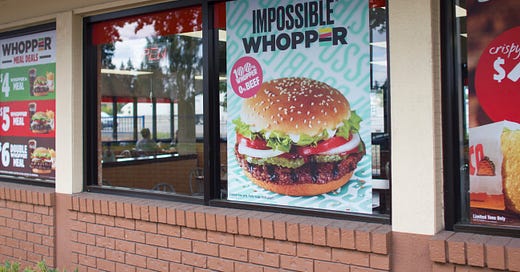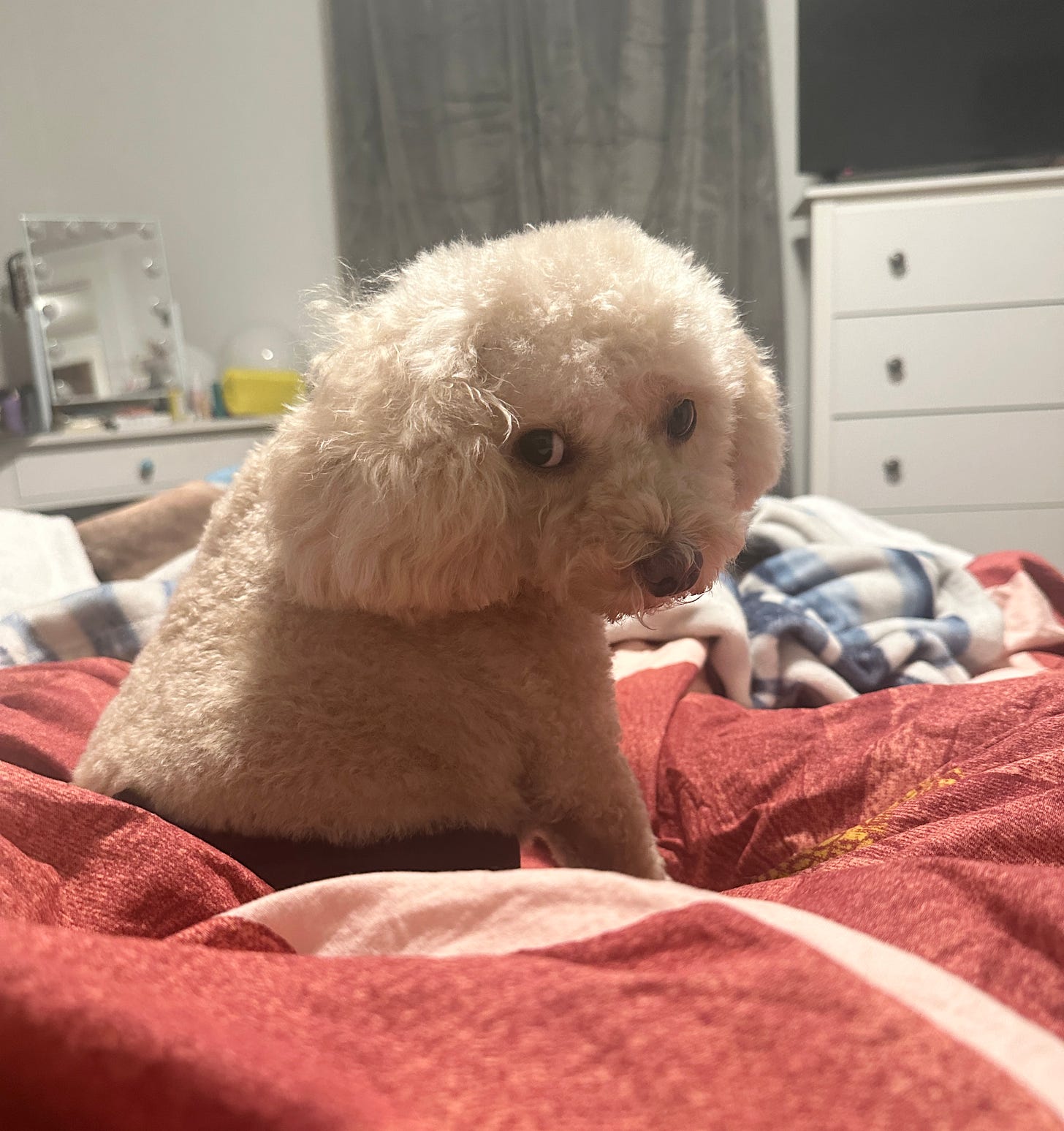"A Vegan World" is the Ultimate Threat
Is the idea that we could have a vegan world ridiculous, or necessary?
It seems to be pretty well accepted, even among animal activists, that veganism — at least as a full-blown individual commitment (“I’m going vegan!”) — isn’t growing. Though the numbers seem to vary, and though I’m really not sure how those numbers are kept (no one has ever asked me), it’s obviously true that we are still a small minority.
You might be thinking: How can I still see veganism as a threat to the animal agriculture industry?
Well, the reason I think that is the case is not just because vegan food options are expanding. That is indeed happening, but the primary source of growth appears to be because people who aren’t vegan are choosing to buy more vegan food, rather than because a lot of people are “going vegan.”
I didn’t actually see that coming. I thought lots of people, when they found out what was happening to animals, would just go vegan. But, be that as it may, the fact remains that vegan food – whether we are talking about foods like lentils or foods like Just Egg – is definitely growing by leaps and bounds.
Of course, the road is a bit bumpy. I know we all thought (or was it just me?) when Burger King started selling Impossible Burgers that we were well on our way to tossing animal agriculture into the dustbin of history. I mean, why would people continue to eat meat, with all its harms, when they could just get an Impossible Burger?
It was an exciting moment, but then the industry started fighting back and spreading misinformation, and a lot of people really didn’t seem to care anyway, and things felt like they were going backwards.
They still kind of feel that way, but when you take a moment and remind yourself of the widespread availability of vegan food, the recognition that wanting a vegan meal in a restaurant is normal, just the pretty-much-universal awareness that it’s a thing and within the realm of customary human behavior, you have to admit that it really is growing. Slower than we want, but still.
Interestingly, the industry doesn’t seem very put out about that. Or at least they pretend not to be. And, no doubt, many industry players just hope to get on board and sell some of those products along with their dead animals.
But what the industry really does seem to fear is the idea, just the very idea, that the human population of the world could, on the whole, be vegan. Which, even I have to admit, seems ridiculous, given where we are. But I’m not even talking about whether they hate the idea that it’s likely to happen; they hate the very idea that it’s theoretically possible.
And it’s not just the industry. Right now it seems almost impossible for anyone to even hear the argument that the human world could be vegan, or even close to. Rather than consider it, even for a split second, as a serious possibility, people just dismiss it out of hand.
No, that’s not right. It’s even weirder.
They don’t even take it in.
It’s like when Murray (a poodle friend of mine), or, for that matter, virtually any other dog, sees himself in a mirror (though it seems to happen to Murray more than most). Sometimes it’s pretty clear that he actually does see his reflection for a split second — especially if he comes upon the mirror by surprise and doesn’t realize that it’s glass — then, almost immediately, he doesn’t see it. It’s not there. It seems like what’s happening in that moment is he realizes it’s not another dog staring back at him, and he just doesn’t get it, so he just decides, somewhere deep in his brain, not to even see it. And so he doesn’t. (Whether this means that dogs aren’t self-conscious, while other animals who have “passed the mirror test” are, is a whole other conversation. I have some thoughts about that as well.)
I assume that that sort of thing happens to all of us all the time. When we just don’t get something, or can’t process it, we just don’t think it’s there.
And, for a lot of people, that’s what happens when someone (maybe me) says that people not only shouldn’t eat animals but they don’t have to, and we could have a vegan world. They hear the first part but just don’t hear the second part. That’s why they answer with a comment on “humane” meat, or how expensive vegan food is, or maybe what people in Africa would eat, and then it just gets uncomfortable and you start to feel that you are, at least vaguely, being accused of being racist and hoping for people to starve to death.
They simply operate on the unexamined assumption that, regardless of a few individuals going vegan, humanity must keep eating animals — it’s what we do, it’s too big to fail, whatever — and they decline to hear that you are, quite seriously, actually saying the opposite.
Even many vegans and animal activists do this, at least to some extent. Even people who care often operate on the assumption that the best we can do is limit the horror in the here and now and that it would be almost counterproductive to engage on the issue of whether anyone has to eat animals at all.
On the other hand, though the rest of the world has its blinders on (I suppose that is a hideous metaphor … sorry), folks in the industry actually engage with the concept of a vegan world. They engage with it to dismiss it, true, so it may seem like the same thing. But it’s not. It’s not that they don’t hear the words, “vegan world.” It’s that they do hear it, and they hate it, and they maybe suspect that it might be possible, and they have to prove that it’s not.
They hate it because veganism is, of course, the obvious ultimate threat. The existential threat.
But, more than that, they have to believe that a vegan world is not possible because if it were, it would mean that what they are doing is very, very bad. If you are doing that to all those animals to “feed the world,” you are a hero (they really, really love that trope), but if you could easily feed the world in some other way, you are a monster. Also, there’s all that money involved.
And, so, everything they do is premised on the idea that we have to have animal agriculture.
For example, take the bizarre situation of methane. As most animal activists know, animals, especially cows, emit, through farts and, mostly, burps, large amounts of methane into the atmosphere. This is a disaster — for both the earth and all its inhabitants, and for the industry — because methane is an extremely powerful greenhouse gas. Manure, which is collected, ton after ton after ton, by the industry in its charmingly named lagoons, also gives off methane. Loads of it. The solution to this quandary that the industry, funded by your tax dollars, has come up with is to collect the methane from the manure lagoons and use it by converting it to “natural gas” and selling it as fuel.
And, it’s true that using natural gas as a fuel, while bad, is much better than simply releasing methane into the atmosphere. So, assuming we have to collect all this manure, this becomes one actual “solution” to climate change. In fact, it’s a win-win-win! No more methane released into the air, so the planet wins! Farmers have a new source of income, so farmers (and who doesn’t love a farmer!) win!! People get cheap fuel for their gas stoves, so everybody wins!!!
But all of these virtuous outcomes are based on the assumption that we must feed the world (true), methane is better used than simply released (true), cows and pigs produce methane (true), and it is inevitable that we will have millions of cows and pigs in factory farms (oops).
The thing is that if a vegan world is possible, then we aren’t going to have factory farms full of cows and pigs, we aren’t going to be producing methane, and we don’t have to find a way to use it.
Hence, we need to find other ways to get power that doesn’t destroy the planet.
So the real question is not how we can make the best out of a bad situation (i.e., methane produced by factory farms); it’s whether we would be better off, and by how much, than if we didn’t create the bad situation in the first place.
Sometimes, we have to take a step back and think about the big questions, but the only way to do that is to envision a vegan world. Once we allow ourselves to have the vision, the vision starts to maybe, then definitely, seem possible. Once it seems possible, we can enable those who are working on countering the real obstacles that might get in the way of it succeeding. Once we think there is a way around those obstacles, the focus can shift to tackling all of the difficulties involved in transitioning the human food supply. Once we attempt to address those difficulties, we can start to eliminate the subsidies propping up animal agriculture. And, once we stop the subsidies, it’s pretty much game over.
It all starts with a vegan world.







dear mariann,
thank you as always for your kind and wise words.
i appreciate this: "Sometimes, we have to take a step back and think about the big questions, but the only way to do that is to envision a vegan world. Once we allow ourselves to have the vision, the vision starts to maybe, then definitely, seem possible."
much love!
myq
Great post. Like I say in my latest post, I don't think we will ever have a vegan world. I don't think enough people care enough, and I doubt they ever will. It's like envisioning a world without wars - it will never fully happen, IMO. Does this mean we should stop campaigning, stop working towards a vegan world or a world without wars? Absolutely not. We should keep doing the work we do, simply because it's the right thing to do. And we might (and probably will) get much, much closer to a vegan world than we are now. Which is totally worth fighting for.